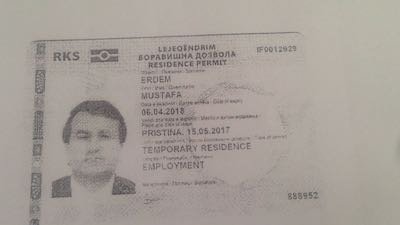Kosovo police detained five Turkish educators who are employees of the Mehmet Akif schools in Kosovo and an academic early Thursday morning over alleged links to the Gülen movement due to pressure exerted by the Turkish government led by autocratic President Recep Tayyip Erdoğan.
 According to a report by Pristina Insight, the Kosovo police detained three Turkish teachers in Gjakova and two Turkish teachers in Prizren.
According to a report by Pristina Insight, the Kosovo police detained three Turkish teachers in Gjakova and two Turkish teachers in Prizren.
According to information obtained by the Stockholm Center for Freedom (SCF) from Kosovo, Yusuf Karabina, the vice director of the Gülistan Educational Institutions, his wife Yasemin Karabina and 15-year-old son were stopped by Kosovo police at 8:30 on Thursday. The Karabina family reportedly resisted the plainclothes police officers since they thought that they could be the agents of the notorious Turkish National Intelligence Organisation (MİT). As a result the three members of the Karabina family were reportedly beaten by Kosovo police during their detention.
As Yusuf Karabina was being taken to the police station, Kahraman Demirez, the principal of Mehmet Akif College in Gjakova, and teachers Cihan Özkan and Hasan Hüseyin Günakan were also detained by the Kosovo police. Mustafa Erdem, the general director of the Gülistan Educational Institutions, was taken into custody when he visited the police station to obtain information about the situation of the detained Turkish teachers.

It was also learned that Turkish cardiology professor Osman Karakaya, who moved to Kosovo to escape the persecution of the Erdoğan regime in Turkey, was also detained by Kosovo police on Thursday morning.
The Turkish government claims the Gülistan Educational Institutions, which operate four Mehmet Akif elementary and high schools in Kosovo, are affiliated with the Gülen movement.
Months ago, Kosovo police arrested Uğur Toksoy, an educator with alleged links to the Gülen movement. Kosovo did not extradite Toksoy to Turkey, but the ordeal still sent shock waves throughout Kosovo’s Turkish community, some of whom told the Balkan Investigative Reporting Network (BIRN) that they fled to Kosovo hoping to escape the Turkish government’s crackdown on the press and individuals and groups with ties to the movement.

According to a report by Pristina Insight, school officials said in a press release that they do not currently know the location of the detainees or the reason for their detention. Nazmi Ulus, director of the Mehmet Akif College in Lipjan, said all of the detainees have residence permits valid until 2022.

Kosovo police spokesman Baki Kelani declined to provide further details but confirmed that “police are undertaking an operation.”
Some Balkan countries have faced pressure from the Erdoğan regime to close private schools linked to the Gülen movement. But Kosovo, whose population is mainly Muslim, had said it had no plans to close down the schools affiliated with the movement.
Turkey is a major supporter of impoverished Kosovo, which declared independence from Serbia in 2008, and Turkish firms run the tiny Balkan country’s sole airport and electricity network and are building two highways worth around $2 billion.

Previously Saudi Arabia, Malaysia, Georgia, Pakistan, Sudan and Myanmar handed over academics, businessmen and school principals due to their alleged Gülen movement affiliations upon the Turkish government’s request despite the fact that some of those victims already had refugee status with the UN. The move drew harsh criticism from human rights organisations.
Turkey survived a controversial military coup attempt on July 15, 2016 that killed 249 people. Immediately after the putsch, the Justice and Development Party (AKP) government along with autocratic President Recep Tayyip Erdoğan pinned the blame on the Gülen movement.
Fethullah Gülen, who inspired the movement, strongly denied having any role in the failed coup and called for an international investigation into it, but President Erdoğan — calling the coup attempt “a gift from God” — and the government initiated a widespread purge aimed at cleansing sympathizers of the movement from within state institutions, dehumanizing its popular figures and putting them in custody.

A total of 48,305 people were arrested by courts across Turkey in 2017 over their alleged links to the Gülen movement, Interior Minister Süleyman Soylu said on Dec. 2, 2017. “The number of detentions is nearly three times higher,” Soylu told a security meeting in İstanbul and claimed that “even these figures are not enough to reveal the severity of the issue.”
















